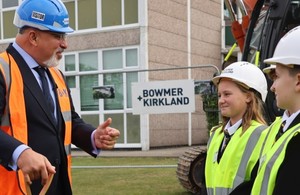Major rebuilds begin at schools across England

Education Secretary ‘breaks ground’ at one of first schools to benefit from new 10-year School Rebuilding Programme
Education Secretary Nadhim Zahawi, today (23rd September) ‘broke ground’ on one of the first 100 schools to be rebuilt under the Prime Minister’s ten-year School Rebuilding Programme, as he joined workers, pupils and staff at West Coventry Academy.
The School Rebuilding Programme carries out major rebuilding and refurbishment projects at school and sixth form college buildings across England, with all new buildings to be net zero carbon in operation.
The Education Secretary was visiting West Coventry Academy, where new buildings will be designed to reduce energy consumption and support the UK’s net zero by 2050 target.
The £38.4 million project is a complete rebuild of the school, and includes a brand new, state of the art sports hall, which will also serve the local community.
The government is currently consulting on how to prioritise which schools will be selected for the School Rebuilding Programme in future.
Education Secretary Nadhim Zahawi said:
Today I broke ground on one of the first 500 schools that the government is rebuilding, which will transform the lives of thousands of children over years to come.
We are revolutionising the school estate to future proof both our children’s education and the environment, with new school buildings that are net zero in operation – leading the charge for more sustainable schools and supporting students and teachers to make a positive impact on the environment.
These rebuilds and refurbishments, with the first 100 projects backed by £2bn government funding, will create world-leading education facilities, from classrooms and science labs to sports halls and dining rooms.
The Department for Education will be showcasing work to make school sites more sustainable at COP26 in November.
Measures to be announced at COP will focus on the government championing climate education and skills, making it easier for schools and pupils to support local biodiversity and make a positive impact on the world around them.
The Department is also looking at how it can take school buildings a step further in lowering their carbon footprint, including research into construction and layout of school sites, the creation of more outdoor spaces within schools, and improvements to the way schools are powered.
COP26 will bring education and climate ministers together from across the world to set out the Government’s vision and encourage others to make commitments to sustainable education – making schools greener, but also equipping young people with knowledge about their environment and highlighting education and training opportunities in the green economy.
ENDS
Published 23 September 2021











Responses